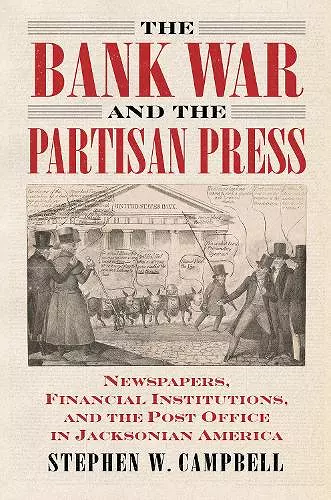The Bank War and the Partisan Press
Newspapers, Financial Institutions, and the Post Office in Jacksonian America
Format:Paperback
Publisher:University Press of Kansas
Published:31st Mar '23
Currently unavailable, and unfortunately no date known when it will be back

President Andrew Jackson’s conflict with the Second Bank of the United States was one of the most consequential political struggles in the early nineteenth century. A fight over the bank’s reauthorization, the Bank War, provoked fundamental disagreements over the role of money in politics, competing constitutional interpretations, equal opportunity in the face of a state-sanctioned monopoly, and the importance of financial regulation—all of which cemented emerging differences between Jacksonian Democrats and Whigs. As Stephen W. Campbell argues here, both sides in the Bank War engaged interregional communications networks funded by public and private money. The first reappraisal of this political turning point in US history in almost fifty years, The Bank War and the Partisan Press advances a new interpretation by focusing on the funding and dissemination of the party press.
Drawing on insights from the fields of political history, the history of journalism, and financial history, The Bank War and the Partisan Press brings to light a revolving cast of newspaper editors, financiers, and postal workers who appropriated the financial resources of preexisting political institutions—and even created new ones—to enrich themselves and further their careers. The bank propagated favorable media and tracked public opinion through its system of branch offices while the Jacksonians did the same by harnessing the patronage networks of the Post Office. Campbell’s work contextualizes the Bank War within larger political and economic developments at the national and international levels. Its focus on the newspaper business documents the transition from a seemingly simple question of renewing the bank’s charter to a multisided, nationwide sensation that sorted the US public into ideologically polarized political parties. In doing so, The Bank War and the Partisan Press shows how the conflict played out on the ground level in various states—in riots, duels, raucous public meetings, politically orchestrated bank runs, arson, and assassination attempts. The resulting narrative moves beyond the traditional boxing match between Jackson and bank president Nicholas Biddle, balancing political institutions with individual actors, and business practices with party attitudes.
"This welcome and highly readable book breathes new fire into Jackson’s dramatic Bank War of the 1830s. It successfully links this epoch-turning event with a modern awareness of the power of government institutions, the functioning of the press, and a measured awareness of how the nation’s financial and economic system actually worked. Through the words and actions of key players, notably Nicholas Biddle and Amos Kendall, it demonstrates that the key disputes were not over the powers of ‘the state’ but whom should benefit from their exercise."—Donald Ratcliffe, author of The One-Party Presidential Contest: Adams, Jackson, and 1824’s Five-Horse Race
"A fresh assessment of Andrew Jackson’s famous Bank War has been long overdue. Deftly interweaving the threads of party politics, finance, journalism, and communications, Stephen Campbell’s The Bank War and the Partisan Press offers a revealing new take on this pivotal yet dimly understood episode. Observers of American government and banking, and of the interconnections between the two, will find this book essential reading."—Daniel Feller, professor of history and director of The Papers of Andrew Jackson, University of Tennessee
"Campbell breathes new life into the history of the Bank War by examining how the burgeoning partisan press, the US Postal Service, and the wider network of internal improvements nationalized this conflict. With this new spin on an old topic, the battle between Nicholas Biddle and Andrew Jackson over the fate of the Bank of the United States offers much insight into how critical American institutions worked in the 1830s and how they led to the formation of a new political order."—Sean Patrick Adams, professor of history, University of Florida
ISBN: 9780700634187
Dimensions: 228mm x 152mm x 13mm
Weight: 363g
232 pages